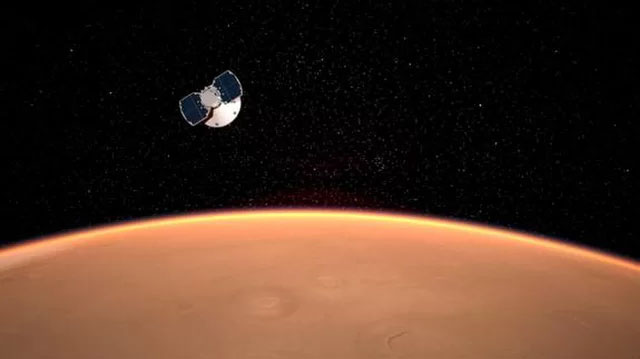NASA probe landed Mars to find out the origin of Earth
The American Aeronautics Agency (NASA) announced on November 25 that the InSight Mars probe will land on Red Planet on November 26 to conduct geological exploration activities.
Director of NASA's InSight Project , Tom Hofman, said that after taking 6 months through the 548km journey, the InSight probe would land on Mars's surface at 20 GMT on November 26 (3 am on the 27th. / 11 hourly Hanoi).

InSight will invade the Martian atmosphere at a speed of 19,310 km / h.
The control center located near Los Angeles is about to make final adjustments to its orbit so that it can approach the landing point on Mars.
If all goes according to plan, InSight will invade the Martian atmosphere at a speed of 19,310 km / h, then reduce the speed thanks to friction, parachutes and missile missiles.
The landing time is expected to take place within 6 and a half minutes and then the vessel can travel at 8km / h on the Martian surface.
In 24 months of operation, equivalent to a year on Mars, the InSight probe, which weighs 360kg, will dig into the Martian surface about 5 meters to measure temperature, while studying the magnitude of the tremor. Red planet face by installing a seismic measuring device.
The InSight project costs about $ 1 billion.
NASA said that geological survey of Mars could help better understand the origin of Earth and other rocky planets in the Solar System more than 4 billion years ago.
- NASA revealed the mission of the next Mars probe
- The mysterious fate of the Mars probe
- NASA admits it is difficult to find life beyond Earth
- NASA broke into the moment the InSight probe landed on Mars successfully
- NASA launched the Mars probe
- 10 outstanding scientific events in the world in 2018
- NASA's new Mars probe captures a detailed picture of the Mars Road Seeer's response in 1997.
- India's Mars probe boarded a 100,000 km orbit
- Mars Express will track the Phoenix robot landed on Mars
- Mars exploration robots will land harassment
- What mystery of Mars awaits discovery?
- NASA lost the Mars probe
 Announced 3 houses on the Moon and Mars
Announced 3 houses on the Moon and Mars Science proves: Mars also knows 'deflated'
Science proves: Mars also knows 'deflated' Elon Musk announced the price for a Mars trip was 11.6 billion VND, free of charge
Elon Musk announced the price for a Mars trip was 11.6 billion VND, free of charge NASA discovered strange 'gate' on Mars, is the hiding place found?
NASA discovered strange 'gate' on Mars, is the hiding place found?